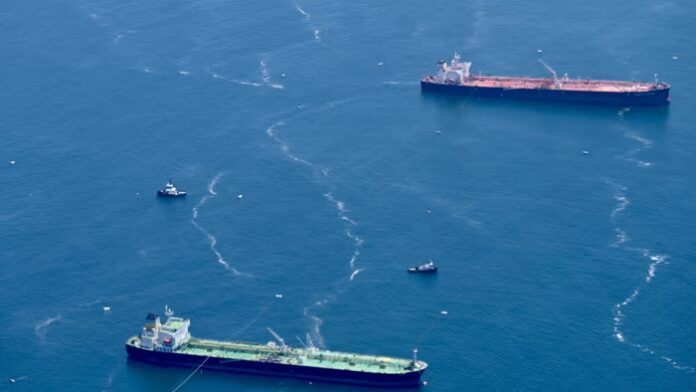Unlock the Editor’s Digest for free
Roula Khalaf, Editor of the FT, selects her favourite stories in this weekly newsletter.
Donald Trump’s campaign to block a climate agreement for the global shipping industry scored a major victory on Friday, dealing a blow to international diplomacy and drawing accusations about its conduct.
The eleventh-hour derailment of the UN-backed Net Zero Framework, provisionally agreed by a majority of countries in April, came after Trump blasted the “global green new scam tax on shipping”.
The proposed levy on shipping carbon emissions was expected to be made legally-binding at this week’s meetings. Trump said the US would “not adhere to [the shipping levy] in any way, shape, or form.”
On Friday afternoon, Saudi Arabia proposed a resolution to adjourn discussions at the International Maritime Organization on the framework’s adoption for a year.
The move was likely to spell the death of the agreement, some observers said, despite previous support for the deal from the EU, UK, India, China and Brazil.
The decision to delay came after a week of talks that diplomats described as “utterly horrendous” as the US and allies piled immense pressure on countries, both in public and private.
One IMO veteran said: “These people, they’re behaving like gangsters. The US delegates are pulling rude faces when others are speaking, challenging the rule of chairman, accusing the IMO secretariat of being biased. I’ve never heard anything like it at an IMO meeting.”
Ralph Regenvanu, minister for climate change of Vanuatu, said delay to the framework was “unacceptable given the urgency we face in light of accelerating climate change”. It would make international discussions at the UN COP30 climate summit in Brazil next month “more difficult”, he said.
But Liberia, the world’s largest so-called “flag state”, with nearly 17 per cent of world shipping sailing under its ensign, had backed a delay, arguing it was critical to “upholding the togetherness” of the IMO.
“We all can see this room is immensely tense and divided,” Liberia’s delegate said during debate on Friday. If the vote on the agreement were not postponed “we all will leave London with a fragmented IMO”, he added.
The IMO secretary-general Arsenio Dominguez concluded the meeting by asking delegates not to clap, since there had been “no winners” from the process, noting “the manner in which the conversations took place”.
“This was not a normal IMO meeting,” he added. “My plea to you is not to repeat the way that we have approached this meeting. In all the future discussions and any other meeting of the IMO.”
The EU, which traditionally votes as a block, fractured as Greece and Cyprus abstained while the remaining countries voted against adjourning talks. Some 57 countries voted to postpone, while 49 voted against and 21 abstained.
This compares with the April vote to pass the framework, when 63 members were in favour, 16 countries opposed and 24 abstained.
The move to kill the shipping framework is part of the wider Trump administration drive to sell more of its oil, coal and gas. It has used forums ranging from the World Bank and securities regulators, to trade and UN-linked negotiations to push countries, financial institutions and businesses into rolling back their climate policies.
In spite of last year being the hottest on record, Trump has described climate change as a “con job” and withdrawn the US from the Paris climate agreement for the second time.
Before the talks started, the US had warned that countries that backed the measure could face their vessels being blocked, visa restrictions and commercial penalties.
Supporters of the framework argued that the US and its allies would use the year’s delay to continue to pile pressure on countries to water down or withdraw their support for the agreement.
The Brazilian delegation, while not explicitly pointing the finger at the US, said the tactics used to put bilateral pressure on countries to block the framework had been unprecedented.
“[These are] methods that should not ever be used among sovereign nations,” it said. “And we hope that this is not replacing negotiations as the normal way for us to make global decisions, for otherwise, there will be no more decisions to be made.”
Under the plans which had been previously agreed, the scheme would impose a carbon price on emissions for ships bigger than 5,000 tons, which is expected to generate revenues of up to $15bn per year from 2030.
The industry delivers about 80 per cent of trade and contributes an estimated 3 per cent to the emissions behind climate change.
Thomas Kazakos, secretary-general, of the International Chamber of Shipping said the industry was “disappointed” with Friday’s outcome. “Industry needs clarity to be able to make the investments needed to decarbonise the maritime sector,” he said.
Additional reporting by Alice Hancock and Eleni Varvitsioti
Climate Capital

Where climate change meets business, markets and politics. Explore the FT’s coverage here.
Are you curious about the FT’s environmental sustainability commitments? Find out more about our science-based targets here
Source link






